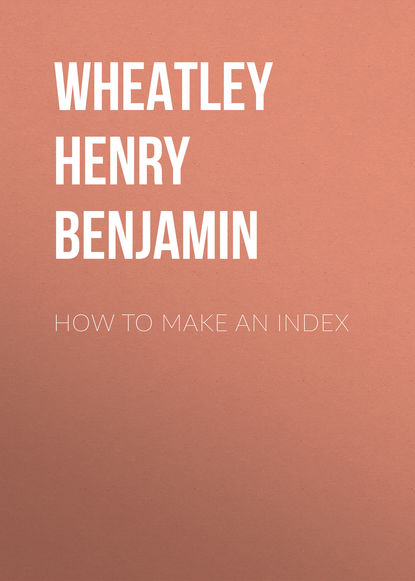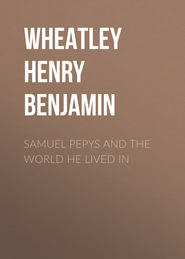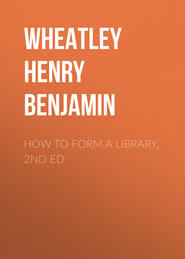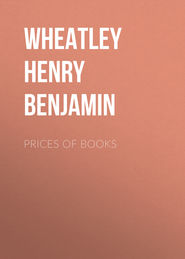По всем вопросам обращайтесь на: info@litportal.ru
(©) 2003-2024.
✖
How to Make an Index
Автор
Год написания книги
2018
Настройки чтения
Размер шрифта
Высота строк
Поля
"Is public taste," etc.
"On reading old books."
"The advantage," etc.
"The blessedness," etc.
"The Book-stall Reader."
"The Girl," etc.
"The Long Life," etc.
"The Preservative," etc.
"The Prosperity," etc.
"Two Classes of Literature."
There are many instances of such bad indexes, but it would be tedious to quote more of them. The amazing thing is that many persons unconnected with one another should be found to do the same ridiculous work, and suppose that by any possibility it could be of use to a single human being. But what is even more astounding is to find intelligent editors passing such useless rubbish and wasting good type and paper upon it.
Another prominent blunder in indexing periodicals is to follow in the index the divisions of the paper. In an alphabetical index there should be no classification, but the alphabet should be followed throughout. Nothing is so maddening to consult as an index in which the different divisions of the periodical are kept distinct, with a separate alphabet under each. It is hopeless to consult these, and it is often easier to turn over the pages and look through the volume than to refer to the index. The main object of an index is to bring together all the items on a similar subject which are separated in the book itself.
The indexes of some periodicals are good, but those of the many are bad. Mr. Poole and his helpers, who had an extensive experience of periodical literature, made the following rule to be observed in the new edition of Poole's Index to Periodical Literature:
"All references must be made from an inspection, and if necessary the perusal of each article. Hence, no use will be made of the index which is usually printed with the volume, or of any other index. Those indexes were made by unskilful persons, and are full of all sorts of errors. It will be less work to discard them entirely than to supply their omissions and correct their errors."
This rule is sufficiently severe, but it cannot be said that it is unjust.
Miss Hetherington, who has had a singularly large experience of indexes to periodicals, has no higher idea of these than Mr. Poole. In an article on "The Indexing of Periodicals" in the Index to the Periodical Literature of the World for 1892, she gives a remarkable series of instances of absurd entries. Some of these are due to the vicious habit of trying to save trouble by cutting up the lists of contents, and repeating the entries under different headings. Miss Hetherington's examples are well worth repeating; but as bad indexing is the rule, it is scarcely worth while to gibbet any one magazine, as most of them are equally bad. It is only amazing how any one in authority can allow such absurdities as the following to be printed. These six groups are from one magazine:
"Academy in Africa, A Monkey's."
"Africa, A Monkey's Academy in."
"Monkey's Academy in Africa, A."
"Aspects, The Renaissance in its Broader."
"Renaissance in its Broader Aspects, The."
"Campaign, His Last, and After."
"His Last Campaign, and After."
"Entertainment, The Triumph of the Variety."
"Triumph of the Variety Entertainment, The."
"Variety Entertainment, The Triumph of the."
"Evicted Tenants, The Irish, Are they Knaves?"
"Irish Evicted Tenants, The, Are they Knaves?"
"French Revolution, Scenes from the."
"Revolution, Scenes from the French."
"Scenes from the French Revolution."
Miss Hetherington adds, respecting this particular magazine: "But the whole index might be quoted. The indexer seems to have had three lists of contents for his purpose, but he has not always dared to use more than two, and so "The Irish Evicted Tenants" do not figure under the class "Knaves." The contributors are on another page, with figures only against their names, the cause of reference not being specified."
Equally absurd, and contrived on a similar system, are the following entries from another magazine:
"Eastern Desert on Foot, Through an."
"Foot, Through an Eastern Desert on."
"Through an Eastern Desert on Foot."
"Finds, The Rev. J. Sturgis's."
"Sturgis's Finds, The Rev. J."
"Complexion! What a Pretty."
"Pretty Complexion! What a."
"What a Pretty Complexion!"
These two groups are from a very prominent magazine:
"Creek in Demerara, Up a."
"Demerara, Up a Creek in."
"Up a Creek in Demerara."
"Home, The Russians at."
"Russians at Home, The."
"The Russians at Home."
In the foregoing, by giving three entries, one, by chance, may be correct; but in the following case there are two useless references:
"Baron de Marbot, The Memoirs of the."









